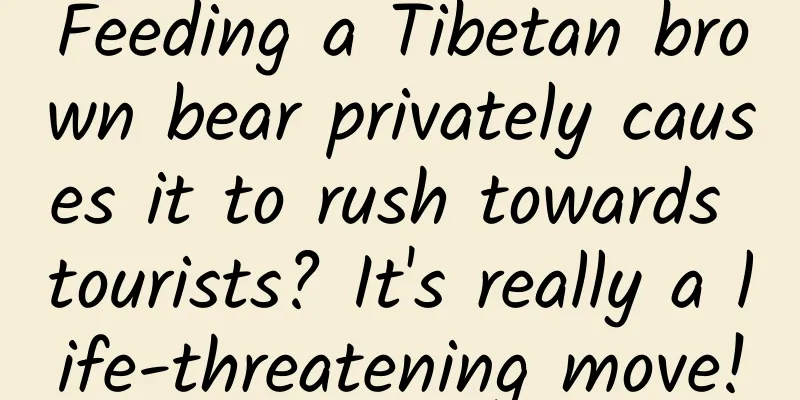Feeding a Tibetan brown bear privately causes it to rush towards tourists? It's really a life-threatening move!

|
Recently, a video of a Tibetan brown bear charging towards tourists has sparked heated discussion online. The incident happened at the Sapu tourist attraction in Burang County, Nagqu City, Tibet. According to staff, the tourists fed two Tibetan brown bears privately despite dissuasion, and one of them snatched the food from the tourists. The two Tibetan brown bears had not hurt anyone in the past, but considering the danger of wild animals, they planned to relocate the two bears. Feeding wild animals is harmful to the animals, the ecology, and humans. Feeding animals can affect their health and disrupt the balance of their populations and the ecology. When animals approach humans for food, not only will germs spread between humans and animals, but they may also bite or injure humans—not to mention the Tibetan brown bear, a ferocious beast that can kill people with a single slap. The Tibetan brown bear (Ursus arctos pruinosus) is a subspecies of the brown bear. The Tibetan brown bear may be the most disliked animal by the Tibetan people. It will rob houses and even kill people. This is a more difficult and complicated contradiction than feeding, but people have found some solutions. "Come back and have a look, your workstation has been robbed by a brown bear! " Liu Xinnong, a staff member of the Shanshui Nature Conservation Center stationed in Angsai, Qinghai, was woken up by a phone call at dawn. The herder neighbor, Brother Qu Nan, on the other end of the phone was terrified. Time goes back to the night before. A huge brown bear was wandering outside the door of Shanshui Angsai Workstation. This is an orange iron container building with iron plates on the doors and windows, which is very sturdy. The brown bear had been eyeing it for several days, and confirmed that the person inside never came back. Finally, it made up its mind to become a thief. Crime scene丨Liu Xinnong So the big brown bear used the balcony railing to sneak up to the roof. He saw that a glass on the roof was broken, and a wooden board was temporarily placed there with a gap, so he stood on the board and sniffed the smell inside. He hoped to find meat, ghee, sugar...but first he had to find a way to get in. "Crack...bang!" The problem of getting in was suddenly solved. The wooden board could not bear the bear's weight, so it decided to surrender first and was crushed! The brown bear fell down. Unfortunately, there was an iron stove underneath, and the heavy bear fell on it, which injured it and caused a pool of blood. The bear was frightened now, and it no longer had to think about how to get into the house, and wanted to escape. So the big guy bumped around in the house and broke all the furniture. Bloodstains left by bears丨Liu Xinnong The family of Brother Qu Nan next door was awakened by the sound. After all, Brother Qu Nan was well-informed and decided to go out to see what was going on. If the neighbor's house was robbed, he could help. But as soon as he went out, he saw the big brown bear slamming open the iron window of the conservation center from the inside and crawling out from the small window - considering its size, it was naturally stuck for a while. Brother Qu Nan turned around and ran. The "next door" of the pastoral area was far enough for him to return to the house safely, close the door and hide with his family. The family chanted scriptures and prayed that the bear would not come to their house. The window where the brown bear escaped is in the round frame丨Liu Xinnong Fortunately, the bear was just scared away and didn’t intend to cause trouble to the neighbors again. The herders waited tremblingly until dawn, and then Brother Qu Nan went out, ran to the nearby mountain to find a signal, and quickly called the station staff of Shanshui. In Tibetan areas, bears destroying houses is a big problem. Shanshui Nature Conservation Center has conducted some special investigations, research and projects on this issue, but unexpectedly, its own base was also destroyed by bears. Eating livestock? That's not a problem Most of the brown bears living in the Chinese part of the Qinghai-Tibet Plateau are the Tibetan subspecies , also known as Tibetan horse bears and blue bears. If you can watch them from a safe place, the Tibetan brown bear can be said to be the best-looking brown bear subspecies. They have a distinct light-colored shoulder strap behind their necks, which looks like a hada, and a "crescent" on their chests that other brown bears do not have. This makes their appearance bright. After the promulgation of the "Wildlife Protection Law of the People's Republic of China" in 1989, hunting in Tibet has become less and less, and the number of brown bears may have increased. But this does not mean that people like bears. The Tibetan brown bear in Lhasa Qushui Zoo has a snow-white cape and looks very beautiful. If there is a vote for Tibetans to choose the animal they hate the most , the brown bear will definitely be voted in by a large margin. In Tibetan, brown bears are called "དྲེད་མོང༌", which sounds very similar to "torture". In some places, "torture" is an insulting word because Tibetans hate brown bears so much. Why do Tibetans hate "torture"? There are three reasons: 1. They eat livestock; 2. They tear down people's houses; 3. They hurt people. Among these, eating livestock is the least important reason. On the Qinghai-Tibet Plateau, brown bears eat livestock, snow leopards eat livestock, and wolves eat livestock, but snow leopards and wolves are far from having the bad reputation of "torturing". Nomadic peoples on the prairie, whether Tibetans, Kazakhs or Mongolians, will encounter wild beasts. It is almost a certainty that livestock are captured and eaten by carnivores every year. They look at livestock being eaten like farmers in the mainland look at fields being hit by frost and drought. They are definitely sad, but when they complain, they just lament that "the year is not good". You can never hate the year. Pika: One of the normal foods of Tibetan brown bears in summer, its number is quite abundant丨Flower Falls into Eclipse Besides, compared with snow leopards and wolves, brown bears have relatively weak hunting abilities. They are good at bullying lambs, but their efficiency in killing strong yaks is very low. Therefore, they are not the main force in hunting cattle and sheep. But house raiding is different. Attention, brothers! There is a lot of food in the house! For the herders in the Tibetan area, houses are also a new thing. They are nomads, and they must "move" around to find water and grass. So, between winter and summer, the nomads will drive yak carts with tents and tools to move between winter and summer pastures. After the tents are dismantled, after a few rains and snows, the grass and trees will grow and there will be no trace left. Since the end of the 20th century, China has implemented a nomadic settlement plan to allow nomads to live in houses. This has changed not only the way of living, but also the living habits. However, the herders' production method of winter and summer migration has not changed, so they live in houses in winter and drive cattle and sheep to summer pastures in summer. The houses that have been built with great effort will definitely not be dismantled like tents. In the summer, they will become a warehouse for storing property, furniture and food, and it is a warehouse that is unattended for several months. House destroyed by brown bear丨Li Juan Compared with animals like snow leopards and wolves that tend to avoid humans, various opportunistic bears are more shameless and like to pick up garbage and steal food, and will not avoid places where people live. Therefore, the "torturers" in Tibetan areas have keenly discovered that there is profit in the change of people's lifestyle: as long as they see that there is no one in the house and knock on the door, they may find a lot of food , ghee, dried meat, and precious white sugar. This is much easier than hunting! In the summer when the incidence of house raiding is the highest, the main food of the "torturers" is marmots and pikas. These two animals are not difficult to find in this season, but to catch them, you still have to dig up the soil to eat them. Even if you catch a big marmot, it will only have ten pounds of meat. In comparison, house raiding is a very profitable thing. To prevent brown bears from raiding their homes, Tibetans would barricade their doors, install barbed wire, and play music nonstop, but to no avail. Some people gave up and simply stored food outdoors or opened doors and windows, which only reduced losses a little. | Shanshui Nature Conservation Center. What's even more annoying is that "torture" will also mess up the house . Maybe it's to find food, or maybe it's just for fun, they will break the furniture in the house, smash the doors and windows, and make a mess of the house. In the past two decades, bears have been destroying people's houses more and more frequently in the Qiangtang area of Tibet and the Sanjiangyuan area of Qinghai. In some places, every household has had their house destroyed by bears. Take Daqing Village in Zhaqing Township, Zaduo County, Qinghai, which was studied by the Shanshui Nature Conservation Center. This is such an unlucky village. Locals reported that many houses were destroyed every year. The bears were sometimes so arrogant that they would even catch marmots and eat them in the house, just like the owners of the house. Marmot: ??? Tibetan brown bear: Don't be confused, you are my staple food in summer丨Flowers fall into eclipse Bears that circle houses are more likely to run into humans, which invisibly increases the chances of bears injuring people , making the whole problem more complicated. Opportunity costs have risen sharply In 2019, a man died in a village in Qinghai Province. He was killed by a brown bear. When people found the victim in the mountains, he was already dying, and he died on the way to Xining for rescue. Before he died, he told his friends that the brown bear finally threw him on a rock, and only turned away after seeing the mess. Tibetan brown bears in Xining Zoo, note the long claws. This incident caused a great uproar in the local area. Everyone's hatred for brown bears increased a lot. Some people thought about revenge, but in the end they did not put it into practice. The country's laws and the teachings of Buddha and Bodhisattva prevented them from doing it. In Tibetan areas, Buddhism is like a lubricant, making the work of animal protectionists much easier; and the law is like a shield, blocking a lot of harm to nature. But if brown bears cause more and more conflicts between humans and animals, these positive effects may become weaker and weaker. The problem is indeed getting worse. In some places where bears are a serious threat, Tibetans will form larger groups when they go up the mountain to collect Cordyceps to encourage each other. We even heard that some herders gave up the opportunity to collect deer antlers in the spring this year because they were afraid of bears in the wild. This is the problem: even if brown bears don't directly hurt people, fear of them will make people give up some opportunities to make a living. This leads to an increase in "opportunity costs." Around March every year, the horns of white-lipped deer and red deer will fall off naturally. Tibetans will drive yaks up the mountain to pick up the horns and sell them. This kind of livelihood will not have any negative impact on animals丨Zhao Xiang So what should we do? Do we have to kill all the bears to solve the problem? No, we can't. We are not barbarians. The law of the country does not allow us to be barbarians. Buddhas and Bodhisattvas also teach us not to be barbarians. The Electric Grid: An Imperfect Barrier To resolve the conflict between humans and bears, we must first solve the problem of bear chow houses. This is the biggest problem at present. Reducing the number of bear chow houses may also reduce the chances of encounters between humans and bears, thereby reducing the possibility of bears injuring people. What should be done? Tibetans have tried such methods as setting up barbed wire nets, keeping hunting dogs, and playing music. However, all of them failed and could not stop the bears. So is there any more advanced and efficient method? Yes, the electric grid. Electric fence to prevent bears丨Shanshui Nature Conservation Center In 2016, the government of Zaduo County, Qinghai Province, and the Shanshui Nature Reserve jointly carried out a pilot project to install bear-proof electric fences in Daqing Village, installing electric fences around the homes of 65 herders who stayed in the village. During subsequent follow-up visits, everyone found that the electric fences were particularly effective in preventing bears from entering the house as long as the electric fences were intact. But the problem is that it must be intact. Bears are afraid of electric grids, but electric grids are afraid of cows. The electric grids currently introduced are soft grids, which are good enough to protect against bears. Because when bears encounter such strange things, they will first touch them with their noses. Such delicate organs will feel uncomfortable when they are hit by electricity. But if a stubborn cow wants to pass through, it will use its horns to push through. The horns are insulated, and then the electric grid will be damaged. As long as there is a gap in the electric grid, the smart bear can get in. Electricity grid installation instructions produced by Shanshui Nature Conservation Center丨Flowers fall into eclipse To install the power grid, herders have to pay a lot of money. The solar battery for power supply costs 3,000 yuan, and the iron stakes and fences around the house cost another 1,000 to 1,500 yuan. This investment is not a one-time investment. If the net is broken, it needs to be repaired, and if the solar battery is broken, it needs to be replaced. This greatly reduces the cost-effectiveness of the bear-proof power grid. But in the final analysis, this is a technical problem. As long as it is a technical problem, it can be solved by technical means . This pilot project is enough to prove that the protection direction of anti-bear power grid is feasible. Tibetan Brown Bear丨Flowers Fall into Eclipse The confrontation and coexistence between humans and bears will continue. We have seen some tragedies, and we have also seen forgiveness. It is not easy to solve the bear problem, but there is nothing easy in this world. Author: Flower Falls into Eclipse We would like to thank Zhao Xiang, Liu Daniu, and Liu Xinnong for their help with this article. This article comes from GuokrNature (ID: GuokrNature) |
>>: Iced coffee, iced water, iced milk, iced tea... How to drink iced drinks in a healthy way?
Recommend
Let the brand sing, not hawk - the RAP rule every brand needs
A few days ago, Mr. TB (Song Zhiming) was asked i...
Who can time the solar system? It's hidden in the stone →
In Shizi, written by Shi Jiao, one of the Hundred...
The Chinese have waited 40 years for this "aircraft carrier"
At present, there is an "aircraft carrier&qu...
Replicable Leadership 2022
Replicable Leadership 2022 Resource Introduction:...
Brand Retail Private Domain Solutions
Precision marketing based on big data is really s...
I love you, China!
Sunrise in the East Knock on the Sky File photo: ...
Is the fission activity not effective? 2 key points to grasp the core
Friends who are engaged in marketing, have you re...
APIs you must know in Html5
The following is a summary of some HTML APIs that...
Analysis of 100 professional accounts on Xiaohongshu for mothers and babies: exposure increased by 30%
Today, we will take the analysis of the professio...
iOS Native and JavaScript Interaction
When it comes to the interaction between Native a...
Website SEO diagnosis and optimization plan case: The website went from “0” to “2” in one month!
Case Description: I made this website myself. Aft...
Community group buying from 0 to 1 practical operation notes
Preface: In early 2018, by chance, I joined a loc...
One picture to understand | Are left-handed people more likely to become artists?
Produced by: Page Expression x Dongdong Miao...
How to light? It's determined by your actions
Novel motion lighting control technology In today...
Focus on the defense of small stars! How strong is the "Chinese compound eye"?
On February 14, the second phase of the "Chi...









